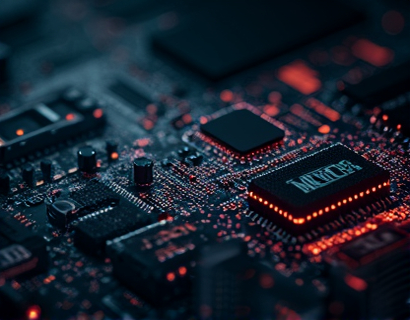Smart Contract Automation: Revolutionizing Financial Management for Businesses
In the rapidly evolving landscape of FinTech, smart contract automation stands out as a transformative solution for businesses seeking to streamline their financial operations. This technology harnesses the power of blockchain to automate and secure the distribution of dividends, earnings, and scheduled payments, offering unparalleled efficiency and transparency. By leveraging smart contracts, businesses can significantly reduce manual errors, enhance security, and improve overall operational efficiency.
Understanding Smart Contracts
Smart contracts are self-executing contracts with the terms of the agreement directly written into code. They run on a blockchain network, which ensures that all transactions are immutable and transparent. Unlike traditional contracts, smart contracts automatically execute actions when predefined conditions are met, eliminating the need for intermediaries and reducing the risk of fraud or human error.
Streamlining Payments with Smart Contracts
One of the most significant advantages of smart contract automation is its ability to streamline payment processes. For instance, when it comes to distributing dividends to shareholders, a smart contract can be programmed to release funds automatically once the specified conditions, such as the passage of a certain date or the completion of a specific event, are met. This not only accelerates the payment process but also ensures that all transactions are recorded on the blockchain, providing a tamper-proof audit trail.
Similarly, for scheduled payments like salaries, rent, or utility bills, smart contracts can be set to trigger payments at predetermined intervals. This automation reduces the administrative burden on finance teams, minimizes delays, and ensures that payments are made precisely when due. The precision and reliability of smart contracts make them an ideal solution for businesses looking to enhance their financial management practices.
Enhanced Security and Transparency
Security is a paramount concern in financial transactions, and smart contracts offer a robust solution. The decentralized nature of blockchain technology means that transaction data is distributed across a network of computers, making it extremely difficult for any single entity to manipulate the data. Each transaction is encrypted and linked to the previous one, forming a chain that is virtually impossible to alter without detection.
Transparency is another key benefit. All parties involved in a smart contract can view the transaction history and the current state of the contract. This level of visibility builds trust among stakeholders and reduces the potential for disputes. In the context of financial obligations, this transparency ensures that all parties are aware of when and how payments are being made, fostering a more cooperative and efficient business environment.
Efficiency Gains Through Automation
The automation of financial processes through smart contracts leads to significant efficiency gains. Manual payment processes often involve multiple steps, including approval, transfer, and recording, each of which is prone to delays and errors. Smart contracts eliminate these steps by automating the entire process. Once the conditions are met, the payment is executed instantly and accurately, reducing the time and resources required for financial management.
For businesses with complex payment structures, such as those with international operations or multiple stakeholders, smart contracts can be particularly beneficial. They simplify the coordination of cross-border transactions, reduce foreign exchange risks, and ensure compliance with regulatory requirements. The automation of these processes not only saves time but also reduces the risk of human error, leading to more reliable and consistent financial outcomes.
Case Studies and Real-World Applications
Several companies have already implemented smart contract automation to great effect. For example, a global financial institution used smart contracts to automate the distribution of dividends to its shareholders. By doing so, they reduced the processing time from several weeks to mere minutes and eliminated the need for intermediaries, resulting in substantial cost savings.
Another instance is a multinational corporation that utilized smart contracts for its global payroll system. The company reported a significant reduction in payroll processing time and a decrease in administrative errors. The transparency provided by the blockchain ensured that all employees and auditors could verify the accuracy of the payments, enhancing trust and compliance.
Challenges and Considerations
While the benefits of smart contract automation are clear, there are several challenges and considerations that businesses should be aware of. One of the primary challenges is the technical complexity of implementing smart contracts. Businesses need to have a solid understanding of blockchain technology and programming to develop and maintain these contracts effectively.
Another consideration is the regulatory environment. As FinTech solutions like smart contracts are relatively new, regulations vary by jurisdiction. Businesses must ensure compliance with local laws and regulations, which can be a complex task. However, as the adoption of blockchain technology grows, regulatory frameworks are likely to become more defined and supportive.
Interoperability is another factor to consider. For businesses operating across multiple blockchain platforms, ensuring that smart contracts can interact seamlessly is crucial. While most blockchain networks are working towards greater interoperability, businesses should plan accordingly to avoid potential integration issues.
Future Trends in Smart Contract Automation
The future of smart contract automation in financial management is promising. As blockchain technology continues to mature, we can expect to see more advanced features and greater adoption across various industries. One trend is the integration of smart contracts with other FinTech solutions, such as artificial intelligence and machine learning, to create more intelligent and adaptive financial systems.
Another area of development is the standardization of smart contract protocols. Standardization will facilitate easier integration and collaboration between different blockchain platforms, making it simpler for businesses to adopt and use smart contracts across their operations.
Additionally, the rise of decentralized finance (DeFi) platforms is opening new possibilities for smart contract automation. DeFi allows for a wide range of financial services, from lending and borrowing to trading and insurance, all powered by smart contracts. As DeFi continues to grow, businesses can leverage these platforms to further enhance their financial management capabilities.
Conclusion
Smart contract automation represents a significant leap forward in financial management for businesses. By automating the distribution of dividends, earnings, and scheduled payments, businesses can achieve greater efficiency, security, and transparency. While there are challenges to consider, the potential benefits make it a compelling solution for companies looking to streamline their financial operations. As the technology evolves and regulatory frameworks adapt, smart contract automation is poised to become an essential tool for businesses aiming to stay competitive in the digital age.











































